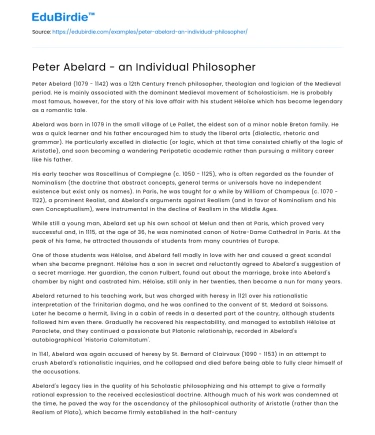Peter Abelard (1079 - 1142) was a 12th Century French philosopher, theologian and logician of the Medieval period. He is mainly associated with the dominant Medieval movement of Scholasticism. He is probably most famous, however, for the story of his love affair with his student Héloïse which has become legendary as a romantic tale.
Abelard was born in 1079 in the small village of Le Pallet, the eldest son of a minor noble Breton family. He was a quick learner and his father encouraged him to study the liberal arts (dialectic, rhetoric and grammar). He particularly excelled in dialectic (or logic, which at that time consisted chiefly of the logic of Aristotle), and soon becoming a wandering Peripatetic academic rather than pursuing a military career like his father.
Save your time!
We can take care of your essay
- Proper editing and formatting
- Free revision, title page, and bibliography
- Flexible prices and money-back guarantee
His early teacher was Roscellinus of Compiegne (c. 1050 - 1125), who is often regarded as the founder of Nominalism (the doctrine that abstract concepts, general terms or universals have no independent existence but exist only as names). In Paris, he was taught for a while by William of Champeaux (c. 1070 - 1122), a prominent Realist, and Abelard's arguments against Realism (and in favor of Nominalism and his own Conceptualism), were instrumental in the decline of Realism in the Middle Ages.
While still a young man, Abelard set up his own school at Melun and then at Paris, which proved very successful and, in 1115, at the age of 36, he was nominated canon of Notre-Dame Cathedral in Paris. At the peak of his fame, he attracted thousands of students from many countries of Europe.
One of those students was Héloïse, and Abelard fell madly in love with her and caused a great scandal when she became pregnant. Héloïse has a son in secret and reluctantly agreed to Abelard's suggestion of a secret marriage. Her guardian, the canon Fulbert, found out about the marriage, broke into Abelard's chamber by night and castrated him. Héloïse, still only in her twenties, then became a nun for many years.
Abelard returned to his teaching work, but was charged with heresy in 1121 over his rationalistic interpretation of the Trinitarian dogma, and he was confined to the convent of St. Medard at Soissons. Later he became a hermit, living in a cabin of reeds in a deserted part of the country, although students followed him even there. Gradually he recovered his respectability, and managed to establish Héloïse at Paraclete, and they continued a passionate but Platonic relationship, recorded in Abelard's autobiographical 'Historia Calamitatum'.
In 1141, Abelard was again accused of heresy by St. Bernard of Clairvaux (1090 - 1153) in an attempt to crush Abelard's rationalistic inquiries, and he collapsed and died before being able to fully clear himself of the accusations.
Abelard's legacy lies in the quality of his Scholastic philosophizing and his attempt to give a formally rational expression to the received ecclesiastical doctrine. Although much of his work was condemned at the time, he paved the way for the ascendancy of the philosophical authority of Aristotle (rather than the Realism of Plato), which became firmly established in the half-century after his death.
Abelard's attempt to bridge the gap between Realism and Nominalism became known as Conceptualism, the doctrine that universals (qualities or properties of an object which can exist in more than one place at the same time e.g. the quality of 'redness') exist only within the mind and have no external or substantial reality. Immanuel Kant later developed a modern Conceptualism, holding that universals have no connection with external things because they are exclusively produced by our a priori mental structures and functions.
In theology, Pope Innocent III (1161 - 1216) accepted Abelard's Doctrine of Limbo, which amended St. Augustine's Doctrine of Original Sin, and which held that unbaptized babies did not, as at first believed, go straight to Hell, but to a special area of limbo, where they would feel no pain but no supernatural happiness either.
Perhaps Abelard's best known work is 'Sic et Non' ('Yes and No'), dating from between about 1121 and 1132, in which he pointed out apparently contradictory quotations from the Church Fathers on many of the traditional topics of Christian theology (such as multiple significations of a single word), and outlined rules for reconciling these contradictions. This work rekindled interest in the dialectic as a philosophical tool, and Abelard argued that dialectic (in addition to the Scriptures) was the road to the truth, as well as being good mental exercise.
He made contributions to the field of Ethics, an area rarely touched on in Scholastic teaching, anticipating something of modern speculation with his idea that the moral character or value of human action is, at least to some extent, determined by subjective intention.
Abelard was also long known as an important poet and composer, although very little remains of his work in this field.






 Stuck on your essay?
Stuck on your essay?

